Current global health challenges are multiple and complex, from the rising burden of disease to the climate crisis to health disparities. These are the same challenges impacting our local communities. The Global Health Collective is a podcast series created to explore some of these issues and the research and work being done in response.
With a focus on the United Nations’ Sustainable Development Goals (SDGs), this podcast invites students, faculty, staff, and global health changemakers from the broader community to share their stories about the differences they’re making towards a more sustainable, brighter world.
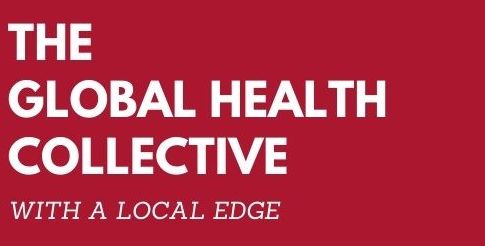

Meet the Host
Shania Bhopa is a current McMaster Global Health graduate student who is passionate about health communications and knowledge translation.
She is the founder and executive director of The Canadian Courage Project, a GTA based non-profit organization striving to assist homeless youth with animal companions.
She is also an educator, with a micro-credential to teach children and young people about the Sustainable Development Goals.
Shania spends her free time learning about mental health and health promotion and is currently writing a wellness book with an aim to help women with their health and well-being.
SEASON 5: KNOWLEDGE TRANSLATION AND MOBILIZATION
A dynamic conversation between Dr. Andrea Baumann and Dr. Sonia Anand on local & global health + reflections on the McMaster GH Office programs.
In this exciting episode, our host Shania speaks to the SCORE! team, which includes Dr. Sonia Anand, Dr. Andrea Baumann, Dr. Russell De Souza, Dr. Sujane Kandasamy and Ms. Parsa Memon. SCORE! Is a project where Health Equity meets Public Health and endeavours to discover effective strategies that can enable Newcomer families when they arrive in Canada to optimize the health trajectories of their children. This includes all aspects of Healthy Active Living to prevent early onset chronic disease risk factors such as overweight and type 2 diabetes while promoting optimal mental health and well-being, community integration, and success at school.
SEASON FOUR: Gender Equity and Women's Leadership in Global Health
How can we be hopeful and make a difference? Join Hila Taraky as she highlights the history of Afghanistan, how we can engage in the discussion about the crisis in Afghanistan, and tangible action towards supporting Afghan refugees. In a time of great distress, Hila discusses that there is hope and how we must make the best of this situation to spark action and create impactful change.
Hila Taraky is a business lawyer who carries on a focused practice in corporate transactions, land development and commercial real estate at Arfocus Legal and the co-founder of Lifeline Afghanistan, a campaign which engages Canadians in supporting the sponsorship of Afghan refugees.
- Donate or lead a fundraiser for organizations that provide relief to Afghans in Afghanistan or supporting those who have made it to Canada:
- The Afghan Women’s Organization’s orphanage for girls in Afghanistan called the “Omid-E-Mirmun” by writing “orphanage for girls” in the private message box and clicking here to donate: https://www.canadahelps.org/en/dn/27920
- Wesley’s Afghan Refugee Fund to assist this Hamilton based organization with the resettlement of Afghan refugees who have made it to Canada: https://wesley.ca/donation-form/
- Lifeline Afghanistan campaign to fund the sponsorship of refugees who have been displaced as a result of the crisis: https://www.lifelineafghanistan.ca/donate/
- Journalists for Human Rights to support their ongoing evacuation and rescue efforts geared towards Afghan journalists: https://www.canadahelps.org/en/charities/jhr-journalists-for-human-rights/campaign/help-evacuate-journalists-from-kabul/
- Learn more about the crisis that is ensuing and determine what your friends, family, community and university are doing to assist Afghans.
- Determine where your Member of Parliament stands on Canadian foreign policy, provision of humanitarian aid and immigration with respect to the crisis in Afghanistan.
- Learn more about, and advocate for, the following policy changes to help streamline pathways to Canada for human rights and women’s rights activists, journalists, lawyers, judges and refugees who are at risk:
- Increase resources to support the expediting of evacuation in Afghanistan of those with Canadian credentials
- Designate Afghans as prima facie refugees and waive the requirement that they produce documentation showing refugee determination by the UNHCR. In the Syrian case, this allowed the government to focus their processing efforts of potential refugees on security, criminality and medical screening which made the processing much faster.
- Canada should further partner with neighboring countries and allies to open their borders to refugees and align efforts to establish efficient resettlement processes.
- Canada should establish special operations centres in countries, such as Pakistan, India, Turkey and Qatar, to provide on the ground processing of refugees and to expedite paperwork, streamlining processes as was done with Syrian refugees.
- The promise to resettle 40,000 Afghan refugees should be in addition to applications that are already in the queue with at least half dedicated to Blended Visa Office Refugees (“BVOR”) and private sponsorship. Canada should not include the processing of Afghan applications in the caps set out for private sponsorship of refugees imposed on Sponsorship Agreement Holders. The government should set an ambitious timetable as it did with the Syrian refugees (e.g. months and not years).
- Canada should streamline the process as they did for Syrian refugees and remove artificial barriers between Government Assisted Refugees (GARs), BVOR and Privately Sponsored Refugees (PSRs) to maximize the flow of people.
- Recognizing economic as well as humanitarian goals, Canada should provide innovative and additional pathways to Canada including expedited work permits. It should remove unnecessary restrictions on student visas including the need for guaranteed return to Afghanistan.
- Remove accountability requirements for Sponsorship Agreement Holders introduced since 2015 requiring that private sponsors provide funding up-front.
- Consider private sponsorship costs eligible as charitable donations with appropriate auditing process in place.
- Support and encourage flexible innovative, collaborative approaches to resettlement, training and pathways to employment including pre-arrival assessments, training and recruitment.
While navigating through this fast paced world, it is important for us to ground ourselves and have faith to find balance. Join Dr. Jean Chamberlain, as she guides us through her journey of balance with her professional life as a physician, professor, and founder of Save the Mothers, along with her family life, and personal life.
Dr. Chamberlain empowers us to be open-minded, supportive, and resilient to make a positive difference in the world.
Dr. Jean Chamberlain is an Obstetrician/Gynecologist, a Professor at McMaster University in the department of Obstetrics and Gynecology with a focus on international women’s health and education, and she is the founder and Executive Director of Save the Mothers, an organization in Uganda that promotes safe motherhood. Dr. Chamberlain is an advocate for women’s health and health education. Her work has gained international recognition and praise for her exceptional impact on the health of mothers globally.
Join Dr. Stephanie Liu, aka Dr. Mom, as she takes us along her journey of self-development and finding balance from her time as an undergrad student, to grad student, to medical student, to physician and mother who runs “lifeofdoctormom,” a medically credible blog on Instagram for new moms, and is the founder of “By Dr. Mom,” a company that empowers parents with evidence driven books, activities, products, and clothing for babies and children. Dr. Liu encourages listeners that it is possible to be great at parenting while managing a full-time career if you ignore the negatives, remember that perfectionism is overrated, set your goals and go get it!
Check out Dr. Stephanie Liu
Instagram: @lifeofdrmom & @bydrmom
Website: bydrmom.com
Although life may never be truly balanced, it is still possible to feel fulfilled in all aspects and that is how Dr. Deborah DiLiberto, a mother and Global Health professor, carries on her day-to-day life. Rather than fixating on one goal, Dr. DiLiberto showcases the beauty of being open to all opportunities and feeling gratitude for one’s unique timeline amidst the world of comparisons and pressures to achieve success at a specific time. As a woman in academia, In this episode, she addresses the challenges when faced against stereotypes about women. Instead of looking at compassion as a weakness, Dr. DiLiberto demonstrates that putting people in the field of view of her work is a strength that helps her feel motivated and ambitious. Join her as she discusses the importance of being true to yourself, sorting your priorities, and how to approach living a fulfilled life.
There is magic in everything and Dr. Priyanka Naidu, a medical doctor and aspiring pediatric reconstructive surgeon, discusses how she consistently finds magic throughout her work. Her work in Operation Smile, formerly as a part of the fellowship program and now as the Senior Advisor to Research, Education, and Innovation, aims to collaborate with local people and develop solutions to address the needs of various countries. Dr. Naidu discusses the importance of female leadership in global health, the need to address health inequities in surgery, and how to attain the Sustainable Development Goals. Join her as she shares her motivations, insights, and journey towards the field of global surgery.
Through the power of transcontinental, transdisciplinary education within the M.Sc. Global Health program, students have gained diverse learning experiences and life-long relationships. In this episode, Shania speaks with MSc Global Health students about their experiences navigating the program, the mobility/exchange options, and the transition from virtual learning to in-person.
Don’t sweat the small stuff and focus on doing your best, even in the worst case scenario. In this episode, we are joined with positive energy from Dr. Deb Sloboda who is a researcher, professor at McMaster University, and one of the founding Co-Presidents of the Developmental Origins of Health and Disease Society of Canada. Her work involves understanding the impact of early life adversity on the mother, and the developing fetus and how fetal adaptations to adversity influence the risk of chronic disease later in life. Join us in a discussion about work-life integration, the incorporation of acts of service and fostering healthy relationships to promote well-being.
In today’s episode hosted by Shania Bhopa and Danielle Denwood, they engage in a dynamic conversation with Ann Keeling from the Women in Global Health.
The discussion focuses on gender equity and women’s economic empowerment. Thinking about the lack of research and absence of data about unpaid women working in health systems across the globe.
It is critical that we begin thinking about and actively engaging in discussions for early career researchers, students, and global health professionals to promote women’s economic empowerment.
_______________________________________________________
Ann Keeling, WGH Senior Fellow, is a British citizen whose 40-year career in global health and social development has included posts in Pakistan, Papua New Guinea, Indonesia, the Caribbean, Belgium, the USA, and her come country, the UK. She held the post of Head of Gender Equality Policy with the UK Government and is currently the Chair of the NGO Age International and Senior Fellow of Women in Global Health. Ann Keeling has been CEO of two global health NGOs, was UNFPA Country Representative and Director Commonwealth Secretariat leading on Health, Education, and Gender.
Follow @womeninGH on Twitter and check out your local chapter today.
As always – any questions or comments DM us at @theglobalhealthcollective
Having empathy can make all the difference in your work and in yourself. In this episode, we are joined by Dr. Amanda Sim, a research fellow, PI and assistant professor at McMaster University. Her work focuses on the intergenerational impacts of war and adversity on child well-being and working with local communities to design and evaluate interventions to promote child and family resilience. Despite the challenges of implementing interventions and change, Dr. Sim discusses improving the well-being of families, refugees, and ourselves through compassion and empathy.
Check out Dr. Amanda Sim’s most recent project in the Hamilton community focused on art workshops and connecting through activity.
SEASON THREE: International Collaboration and Virtual Mobility
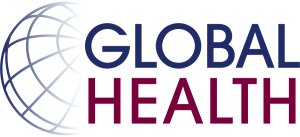
With pandemic-related travel restrictions, the 2021 mobility options pivoted to online and virtual. Hear from graduate students Evelyne Onari, Alison Tidmarsh, and Yordan Stoyanov about their experience in the virtual mobility options at Maastricht University and Universidad del Rosario.
Have you ever wondered what it is like starting a project or a non-profit organization .. during a pandemic! Well look no further, we present to you a conversation between 4 young founders (and full-time students) on how they went from an idea to a full-blown operating organization.
Shania Bhopa – Founder of The Canadian Courage Project sits down with Luke Kyne; Founder of the Hamilton Homeless Hub, Sukhmeet Sachal founder of the Sikh Health Foundation, and Adamo Donovan founder of PPE portraits Canada.
This conversation is created to inspire, empower and showcase the details behind starting an organization and balancing life as students.
Being the change they wish to see and hope to see you be a part of as well.
This episode is all about female empowerment, ecology, and environmental health.
Welcoming Avanti Wadugodapitiya an Ecologist from Colombo, Sri Lanka, and currently works at the Department of Health, Ethics and Society at Maastricht University in the Netherlands.
Avanti Wadugodapitiya works on the Global Health programme at Maastricht University. She is also an alumna of the programme and participated in the Learning Symposium in 2015. She is originally from Sri Lanka, but is currently based in the Netherlands.
Welcoming Dr. Arathi Rao a phenomenal Global Health Leader and Coordinator for the MPH Program, Department of Health Policy and the Coordinator for the Manipal Health Literacy Unit at PSPH, MAHE, Manipal.
Arathi Rao is the program co-ordinator for the Masters in Public Health (MPH) program in the Department of Public Health, Manipal Academy of Higher Education.
Her roles and responsibilites include teaching concepts of community and public health to undergraduate medical students (MMMC) & Master’s degree in Public Health (Manipal Academy of Higher Education), facilitating and teaching students from international universities, and co-ordinating student research and field exposure trips to various public health organizations.
Join Margherita Paola Poto, as she discusses about empathy, compassion and care in the environment. Despite the Arctic being one of the coldest places on Earth, Margherita’s stories of exploration in the Arctic bring warmth as she provides a refreshing insight on developing relationships among people and the Earth.
Margherita Paola Poto is a Researcher at the Faculty of Law, UiT The Arctic University of Norway and a Professor of Administrative Law from the University of Turin, Italy. She is currently involved in an interdisciplinary project at the crossroads of food, environment, and health. Her research interests cover administrative and comparative law, environmental law, indigenous law and methodology, ocean and nature-centered visions. She is particularly interested in new methodological approaches to law that encompass indigenous methodologies, community and gender-sensitive research, storytelling and illustration.
Season Two
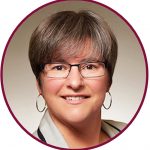 Karen Mossman, Ph.D., is a Professor in the Department of Pathology and Molecular Medicine, and Vice President Research at McMaster University, Canada. She completed her undergraduate Honors BSc in Molecular Biology and Genetics from the University of Guelph in 1992, her Ph.D. in Biochemistry in 1997 and her Post-doctoral Fellowship in Molecular Microbiology and Immunology in 2001, both at the University of Alberta. Dr. Mossman is the recipient of the Milstein Young Investigator Award and Christina Fleischmann Award from the International Society for Interferon and Cytokine Research. Dr. Mossman has published over 150 peer-reviewed scientific publications and has contributed as author and editor to numerous books, including virology textbooks.
Karen Mossman, Ph.D., is a Professor in the Department of Pathology and Molecular Medicine, and Vice President Research at McMaster University, Canada. She completed her undergraduate Honors BSc in Molecular Biology and Genetics from the University of Guelph in 1992, her Ph.D. in Biochemistry in 1997 and her Post-doctoral Fellowship in Molecular Microbiology and Immunology in 2001, both at the University of Alberta. Dr. Mossman is the recipient of the Milstein Young Investigator Award and Christina Fleischmann Award from the International Society for Interferon and Cytokine Research. Dr. Mossman has published over 150 peer-reviewed scientific publications and has contributed as author and editor to numerous books, including virology textbooks.
Dr. Mossman joined McMaster University in July of 2001, with a research focus on understanding the interactions between viruses and their hosts, both in normal healthy cells and in cancer cells, with the goal of developing novel therapy approaches for emerging viral infections and cancer. These studies of virus-host interactions led to the development of herpesvirus-based oncolytic viruses for cancer immunotherapy. She is currently working with industry to develop Bovine herpesvirus type I as a clinical oncolytic virus vector. More recently, her group helped isolate SARS-CoV-2 from Canadian patients and is actively working on COVID-related studies. Dr. Mossman currently serves on the Board of Mitacs, the Board of McMaster HealthLabs, as co-chair of the Council of Ontario Universities COVID task force and as Chair of the Board of the McMaster Innovation Park.
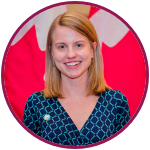 Hayley Mundeva is the Founder and CEO of ThriveHire, an online career and community platform for the global health industry. Before this, Hayley worked on Global Health research projects in Tanzania, Malawi and Ethiopia and earned 2 degrees in Global Health. Despite starting her career in research, Hayley was surprised to find little information on ways to launch and develop a GlobalHealth career. This is what sparked her interest in founding ThriveHire. Since then, Hayley and her team have formed partnerships with universities and global health organizations including the Red Cross, theClinton Health Access Initiative, and the World Bank’s Global Financing Facility. Hayley is currently based in Rwanda where she is spearheading partnerships with local and international organizations.
Hayley Mundeva is the Founder and CEO of ThriveHire, an online career and community platform for the global health industry. Before this, Hayley worked on Global Health research projects in Tanzania, Malawi and Ethiopia and earned 2 degrees in Global Health. Despite starting her career in research, Hayley was surprised to find little information on ways to launch and develop a GlobalHealth career. This is what sparked her interest in founding ThriveHire. Since then, Hayley and her team have formed partnerships with universities and global health organizations including the Red Cross, theClinton Health Access Initiative, and the World Bank’s Global Financing Facility. Hayley is currently based in Rwanda where she is spearheading partnerships with local and international organizations.
 Dr. Sonia Anand is the Associate Chair, Equity, and Diversity, Department of Medicine and Director, Population Genomics Program, Department of Clinical Epidemiology and Biostatistics. Dr. Sonia Anand was only 33 years old when she landed the Eli Lilly Canada-May Cohen Chair in Women’s Health. Although her present research involves the environmental and genetic determinants of vascular and peripheral vascular disease in populations of varying ancestral origin, she is most recognized for her research on women’s health issues, particularly in the area of cardiovascular disease. The care and treatment of women’s cardiovascular disease, unique in its latent and non-specific symptoms, must differ from the standard employed for men to be successful, and Dr. Anand’s research is innovative in making this a priority.
Dr. Sonia Anand is the Associate Chair, Equity, and Diversity, Department of Medicine and Director, Population Genomics Program, Department of Clinical Epidemiology and Biostatistics. Dr. Sonia Anand was only 33 years old when she landed the Eli Lilly Canada-May Cohen Chair in Women’s Health. Although her present research involves the environmental and genetic determinants of vascular and peripheral vascular disease in populations of varying ancestral origin, she is most recognized for her research on women’s health issues, particularly in the area of cardiovascular disease. The care and treatment of women’s cardiovascular disease, unique in its latent and non-specific symptoms, must differ from the standard employed for men to be successful, and Dr. Anand’s research is innovative in making this a priority.
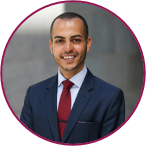 Ahmad Firas Khalid is a medical doctor and a Ph.D. graduate from the Health Policy Ph.D. at McMaster University, having been supervised by Dr. John Lavis. Previously, Firas worked as a health policy researcher at the Research Unit on Humanitarian Stakes and Practices (UREPH) at Médecins Sans Frontières (MSF) in Geneva, Switzerland. He also worked in the Department of Child and Maternal Health at the World Health Organization (WHO) in Geneva, Switzerland.
Ahmad Firas Khalid is a medical doctor and a Ph.D. graduate from the Health Policy Ph.D. at McMaster University, having been supervised by Dr. John Lavis. Previously, Firas worked as a health policy researcher at the Research Unit on Humanitarian Stakes and Practices (UREPH) at Médecins Sans Frontières (MSF) in Geneva, Switzerland. He also worked in the Department of Child and Maternal Health at the World Health Organization (WHO) in Geneva, Switzerland.
Firas consulted on a number of health policy projects for the department of information, evidence, and research department in the WHO Regional Office for the Eastern Mediterranean and for Health Canada in Ottawa. Firas has expertise in medicine, education, health policy, knowledge translation, and health emergencies working with relief and intergovernmental organizations. Currently, Firas lectures at McMaster University Faculty of Health Sciences.
 Brighton Kaoma, is a young health activist, MPA graduate from Columbia University with a vast track record in working at the intersection of sustainable development, business development, corporate sustainability, He is has worked in communication for development, and youth development in over 20 countries across Africa, Europe, Asia, and America. Brighton has been awarded and recognized by President Barack Obama, Queen Elizabeth II, Angela Merkel, WWF International President, UN Environment, and Junior Chamber International (Osaka, Japan).
Brighton Kaoma, is a young health activist, MPA graduate from Columbia University with a vast track record in working at the intersection of sustainable development, business development, corporate sustainability, He is has worked in communication for development, and youth development in over 20 countries across Africa, Europe, Asia, and America. Brighton has been awarded and recognized by President Barack Obama, Queen Elizabeth II, Angela Merkel, WWF International President, UN Environment, and Junior Chamber International (Osaka, Japan).
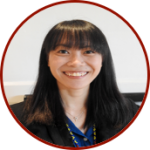 Mika Tan has been working with youth in the environmental scene for the past decade. Her expertise lies in youth empowerment, urban biodiversity, systems thinking, capacity building, public speaking, and hosting and facilitation. Currently, she is the Coordinator of the ASEAN Youth Biodiversity Programme (AYBP) at the ASEAN Centre for Biodiversity, as well as the Co-Founder of the Urban Biodiversity Hub (UBHub). As AYBP Coordinator, Mika works with the Global Youth Biodiversity Network (GYBN) to craft training and mentorship programmes, forge connections to bridge the policy-implementation gap, and empower youth in the ASEAN region to fight biodiversity loss. As Co-Founder and Co-Director of the Urban Biodiversity Hub (www.ubhub.org), Mika leads an international team of professional collaborators, building partnerships to enable local governments to plan with nature. An interdisciplinary thinker, Mika holds a B.A. in Environmental Studies (Conservation Biology) from Middlebury College, USA, and is an inaugural Middlebury Social Entrepreneurship Fellow and a Loke Cheng-Kim Scholar.
Mika Tan has been working with youth in the environmental scene for the past decade. Her expertise lies in youth empowerment, urban biodiversity, systems thinking, capacity building, public speaking, and hosting and facilitation. Currently, she is the Coordinator of the ASEAN Youth Biodiversity Programme (AYBP) at the ASEAN Centre for Biodiversity, as well as the Co-Founder of the Urban Biodiversity Hub (UBHub). As AYBP Coordinator, Mika works with the Global Youth Biodiversity Network (GYBN) to craft training and mentorship programmes, forge connections to bridge the policy-implementation gap, and empower youth in the ASEAN region to fight biodiversity loss. As Co-Founder and Co-Director of the Urban Biodiversity Hub (www.ubhub.org), Mika leads an international team of professional collaborators, building partnerships to enable local governments to plan with nature. An interdisciplinary thinker, Mika holds a B.A. in Environmental Studies (Conservation Biology) from Middlebury College, USA, and is an inaugural Middlebury Social Entrepreneurship Fellow and a Loke Cheng-Kim Scholar.
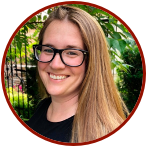 Claire Bodkin is a queer femme, community organizer, and resident physician in Family Medicine at McMaster University. She is a white settler living on the territory of the Anishinaabe and Haudenosaunee nations covered by the Dish With One Spoon wampum treaty. As a family doctor-in-training, her clinical and research interests are the care of people who use drugs, people who experience incarceration, and people who are queer and trans. She is a co-organizer with Hamilton Social Medicine Response Team (known as HAMSMaRT), who has been working with Hamilton’s harm reduction group Keeping Six to support the needs of people who are homeless and people who use drugs during the COVID-19 pandemic. She looks up to her Mom, her sister, and all of the rad community organizers, elders, and youth working towards collective freedom and health.
Claire Bodkin is a queer femme, community organizer, and resident physician in Family Medicine at McMaster University. She is a white settler living on the territory of the Anishinaabe and Haudenosaunee nations covered by the Dish With One Spoon wampum treaty. As a family doctor-in-training, her clinical and research interests are the care of people who use drugs, people who experience incarceration, and people who are queer and trans. She is a co-organizer with Hamilton Social Medicine Response Team (known as HAMSMaRT), who has been working with Hamilton’s harm reduction group Keeping Six to support the needs of people who are homeless and people who use drugs during the COVID-19 pandemic. She looks up to her Mom, her sister, and all of the rad community organizers, elders, and youth working towards collective freedom and health.
Season One
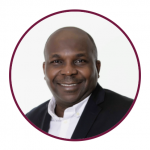 Bonny Ibhawoh is Professor and Senator William McMaster Chair in Global Human Rights at McMaster University, Canada. He teaches in the Department of History and the Centre for Peace Studies. He is currently the Director of the Centre for Human Rights and Restorative Justice at McMaster University.
Bonny Ibhawoh is Professor and Senator William McMaster Chair in Global Human Rights at McMaster University, Canada. He teaches in the Department of History and the Centre for Peace Studies. He is currently the Director of the Centre for Human Rights and Restorative Justice at McMaster University.
He Chairs the United Nations Expert Mechanism on the Right to Development in the Office of the United Nations High Commissioner for Human Rights in Geneva. He has taught in Universities in Africa, Europe and North America.
He previously worked as a Research Fellow at the Danish Centre for Human Rights, Copenhagen and at the Carnegie Council for Ethics and International Affairs, New York. He has authored several books on human rights, legal studies and peace/conflict studies.
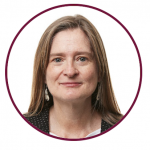 Tina Moffat is an associate professor and chair of the Department of Anthropology. Her area of interest is nutrition and food insecurity as it relates to the sociocultural and physical environments. Her research perspectives are grounded in biocultural and political-economic approaches, and her main geographic areas of focus are Canada and South Asia.
Tina Moffat is an associate professor and chair of the Department of Anthropology. Her area of interest is nutrition and food insecurity as it relates to the sociocultural and physical environments. Her research perspectives are grounded in biocultural and political-economic approaches, and her main geographic areas of focus are Canada and South Asia.
Moffat’s current research focuses on knowledge translation and support for pregnant women regarding Developmental Origins of Health and Disease (DOHaD) as it relates to maternal diet and child health outcomes. This community study, called “Mothers to Babies” (M2B), is based in Hamilton.
Moffat currently holds a SSHRC Research Engage Grant for evaluation of youth food programming at the Hamilton Community Food Centre (HCFC), part of a movement to support food insecure populations in accessing nutritious food in a dignified manner. She has also done research on food security and dietary change among Canadian immigrants and refugees, vitamin D intake in North America, and the social and cultural determinants of child obesity.
Listen to UN75 Dialogue/ The Climate Crisis: A Race We Can Win
 Josipa Petrunic is the President & CEO of CUTRIC. She is leading the formulation of several national transportation technology trials related to zero-emissions transportation and “smart vehicles” innovation, including the Pan-Canadian Electric Bus Demonstration & Integration Trial, the Pan-Canadian Hydrogen Fuel Cell Demonstration & Integration Trial, and the National Smart Vehicle Demonstration Project.
Josipa Petrunic is the President & CEO of CUTRIC. She is leading the formulation of several national transportation technology trials related to zero-emissions transportation and “smart vehicles” innovation, including the Pan-Canadian Electric Bus Demonstration & Integration Trial, the Pan-Canadian Hydrogen Fuel Cell Demonstration & Integration Trial, and the National Smart Vehicle Demonstration Project.
 Tasha Goldberg is a writer and video producer. She has travelled the world reporting at United Nations negotiations and events on the topic of sustainable development. Tasha is also an ongoing contributor to the Economist Intelligence Unit, focused on the topics of food sustainability and ocean sustainability. In 2004, she founded a business consultancy Sustainable Solutions to implement strategic sustainability programs globally and maintaining an active voice in the ongoing planetary dialogue of sustainable development. Her efforts focused on empowering indigenous communities, adding value throughout supply chains, cultivating carbon awareness, and fostering the sustainable use of natural resources.
Tasha Goldberg is a writer and video producer. She has travelled the world reporting at United Nations negotiations and events on the topic of sustainable development. Tasha is also an ongoing contributor to the Economist Intelligence Unit, focused on the topics of food sustainability and ocean sustainability. In 2004, she founded a business consultancy Sustainable Solutions to implement strategic sustainability programs globally and maintaining an active voice in the ongoing planetary dialogue of sustainable development. Her efforts focused on empowering indigenous communities, adding value throughout supply chains, cultivating carbon awareness, and fostering the sustainable use of natural resources.
With a GHG Accountant Certificate from the Greenhouse Gas Management Institute, Tasha has collaborated with businesses, governmental agencies, elders, scientists, and artists. She has worked with a colorful range of clients such as the World Wild Fund for Nature (WWF), the International Trade Center (ITC, a joint agency of United Nations and World Trade Organization), IISD Reporting Services, Ethical Coach, Estee Lauder, Aveda, Neill Corporation, and others.
Tasha has recently founded Evidence of Hope, a series of portraits featuring people and projects from around the world who are addressing global challenges, successfully! Each portrait engages the audience through a positive narrative, presenting what is working and how it is working. Evidence of Hope documents and supports progress that is happening right now, demonstrating the reason we should have hope for a sustainable future.
 Dr. Peter Singer is the former Chief Executive Officer of Grand Challenges Canada. He is also Professor of Medicine at University of Toronto, Director at the Sandra Rotman Centre at University Health Network, and Foreign Secretary of the Canadian Academy of Health Sciences. In 2007, Dr. Singer received the Michael Smith Prize as Canada’s Health Researcher of the Year in Population Health and Health Services. In 2011, Dr. Singer was appointed an Officer of the Order of Canada for his contributions to health research and bioethics, and for his dedication to improving health in developing countries. In 2014, he was named by the UN Secretary General’s Office as Co-Chair of the Every Woman Every Child Innovation Working Group.
Dr. Peter Singer is the former Chief Executive Officer of Grand Challenges Canada. He is also Professor of Medicine at University of Toronto, Director at the Sandra Rotman Centre at University Health Network, and Foreign Secretary of the Canadian Academy of Health Sciences. In 2007, Dr. Singer received the Michael Smith Prize as Canada’s Health Researcher of the Year in Population Health and Health Services. In 2011, Dr. Singer was appointed an Officer of the Order of Canada for his contributions to health research and bioethics, and for his dedication to improving health in developing countries. In 2014, he was named by the UN Secretary General’s Office as Co-Chair of the Every Woman Every Child Innovation Working Group.